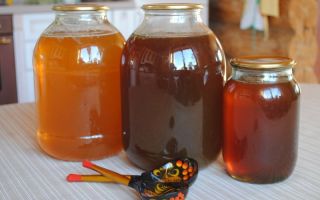Content
Honeydew honey is distinguished among beekeeping products. In European countries, it is of significant value. On the territory of the CIS, the product is classified as second-rate. The benefits and harms of honeydew honey for humans are due to its chemical composition. They should be taken into account when consuming a treat.
What is the color of honeydew honey
Beekeeping products are healthy treats. Not only flower varieties have healing properties. The viscous mass is sometimes of animal origin.
Honeydew honey is obtained by processing the liquid on the leaves of plants. It is viscous and lacks the smell characteristic of beekeeping products. The delicacy is distinguished by the following shades:
- light brown;
- brown;
- greenish.
How honey is obtained
It is noteworthy that the delicacy is not always the result of processing the nectar of flowers. Sometimes bees have to look for other sources to make a sweet product. Often the cause of this phenomenon is drought and insufficient nectar secretion by flowers. In such cases, bees use sweet secretions found on the leaves of various trees, called padya.
Sweet selections can be found on the following trees:
- oak;
- aspen;
- willow;
- Linden;
- larch;
- fir;
- spruce;
- mountain pine.
The formation of liquid occurs under the influence of high temperatures.
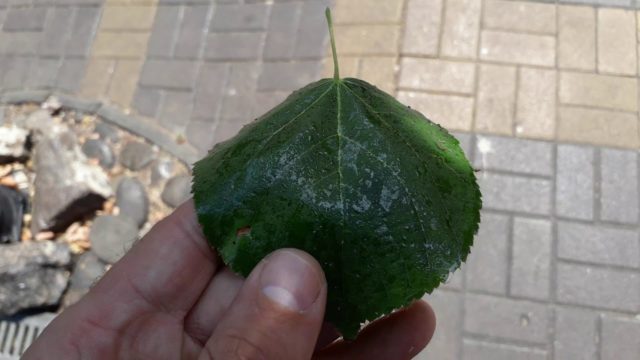
Sometimes on the leaves there are secretions that have an animal character. A sticky liquid is secreted by small insects that feed on plant sap. For example, worms, aphids and leaf fleas leave a sticky salivary discharge. They are collected by bees because of their high sugar content.
Pad is collected everywhere. However, bees use it only in exceptional cases, in the absence of the possibility of obtaining nectar from honey plants. The sweet liquid contains an adequate amount of aromatic volatiles and sucrose (at least 4%).
Bees that produce honeydew honey from the liquid on plant leaves have a shorter lifespan. Insects do not collect it with a sufficient number of nectar-bearing flowers.
How to distinguish and identify honeydew honey at home
The beekeeping product has certain characteristics. Honeydew honey is different:
- Color... If the sweet mass is of animal origin, it has a dark shade. Brown or brown color is inherent in deciduous sources. Sometimes the delicacy has a light green tint if it is given by conifers.When mixing pollen and honeydew, a product is obtained with a light golden hue.
- Taste... The gooey mass is quite sweet. No characteristic aftertaste is observed after consuming the beekeeping product.
- Smell... There is usually no aroma.
- Sugar time. Crystallization for honeydew treats is not common. A granular precipitate sometimes appears.
- Consistency... Honeydew honey resembles tar. It is a thick and viscous mass.
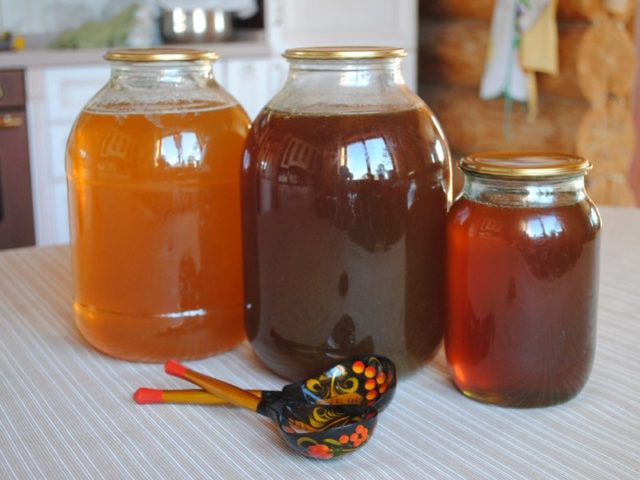
The viscous mass has characteristic features. Distinctive features of honeydew honey are a significant amount of proteins, nitrogenous and mineral substances with a deficiency of inverted sugars. Experts note that a beekeeping product is a good source of:
- amino acids;
- melitoses;
- dextrin;
- lipids.
What flavors can honeydew honey have?
The delicacy is very sweet. The presence of flavors depends on the source of honeydew honey. Bitterness is possible. In some cases, a malt flavor is noted.
Does honeydew honey belong to natural honeys
The opinions of experts about the benefits of a beekeeping product are ambiguous. In Western Europe, honeydew honey is highly valued, as it is usually collected from the so-called honeydew. The delicacy is rich in ash elements and potassium. In Russia, the honeydew product belongs to the second grade. Bees often collect it from animal excretions.
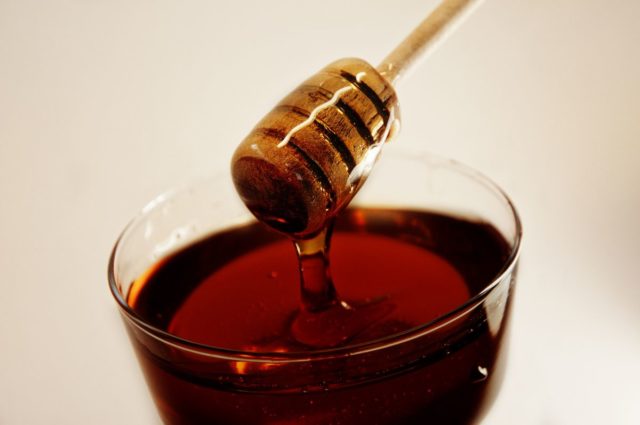
Chemical composition
Both the properties and the presence of valuable substances vary depending on the following factors:
- a type of plant that produces a sweet liquid;
- proportions of animal and vegetable pad;
- collection period;
- climate features;
- the presence of pollen, as well as its amount.
Among the valuable nutrients contained in the delicacy are:
- iron;
- potassium;
- manganese;
- cobalt;
- amino acids;
- fructose;
- nitrogenous components;
- proteins.
It has been proven that honey obtained from the honeydew of coniferous trees is rich in phosphorus. Animal sources determine the protein content of the beekeeping product. The vegetable pad explains the presence of carbohydrates in the viscous mass.
The presence of useful components depends on the correct storage of the beekeeping product. A honeydew treat is placed in a darkened place. The container must be glass and tightly closed. Storage temperature ranges from 5 to 18 ° C.
Honeydew varieties
Since bees mix nectar and secretions from plants in the process, it is rather difficult to find a pure product on sale. Some beekeepers combine flower and honeydew honey to add value to the treat.
The peculiarities of the viscous mass are due to its origin. It is known that the cause of the appearance of honeydew honey is the periods of summer drought. They negatively affect vegetation and nectar secretion. The sweet liquid on the leaves becomes an alternative source.
Honeydew honey has the following varieties:
- vegetable, characterized by an abundance of sugars;
- an animal characterized by the presence of proteins.
Why honeydew honey is useful
Experts emphasize that the product cannot be used for feeding bees in winter due to the significant content of nitrogenous compounds and minerals. However, honeydew honey is very useful for humans.
The beekeeping product is actively used in various fields of medicine. The viscous mass is also used in cosmetology.
The delicacy has the following useful properties:
- strengthening of bone tissue due to the presence of phosphorus and potassium;
- protection of the vascular walls and heart muscle;
- reimbursement of energy costs during intensive sports;
- removal of muscle and nervous tension;
- stimulation of hemoglobin and prevention of the development of anemia;
- normalization of the functioning of the digestive system;
- improvement of complexion, elimination of edema and scars.
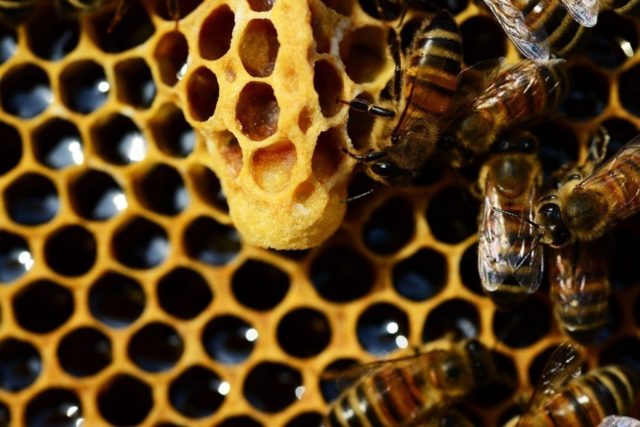
The beekeeping product is good for the elderly. It can be used as a preventive measure. The use of delicacies increases immunity, promotes rejuvenation of the body, and reduces the risk of developing atherosclerosis. Replenishing the deficiency of substances necessary for health is essential.
How to take it right
A beekeeping product can be regarded as a medicine. The correctness of its use is essential. This is due to the fact that honeydew honey brings both benefits and harm to health. The treat is packed with nutritious nutrients. The daily intake is reduced to a tablespoon. The viscous mass is not heated in order to maintain its beneficial properties. It is usually taken before meals. A useful beekeeping product can be washed down with tea or water.
Contraindications to the use of honeydew honey
Any beekeeping products often provoke the occurrence of undesirable reactions. Honeydew honey has both beneficial properties and contraindications. The delicacy is not consumed in the following cases:
- allergy;
- acute diarrhea;
- obesity;
- children's age up to two years;
- pregnancy.
Conclusion
The benefits and harms of honeydew honey for humans have been proven by numerous studies. The beekeeping product is considered a delicacy and a powerful natural medicine. Its combination with floral varieties of honey allows you to eliminate the manifestations of various diseases.

